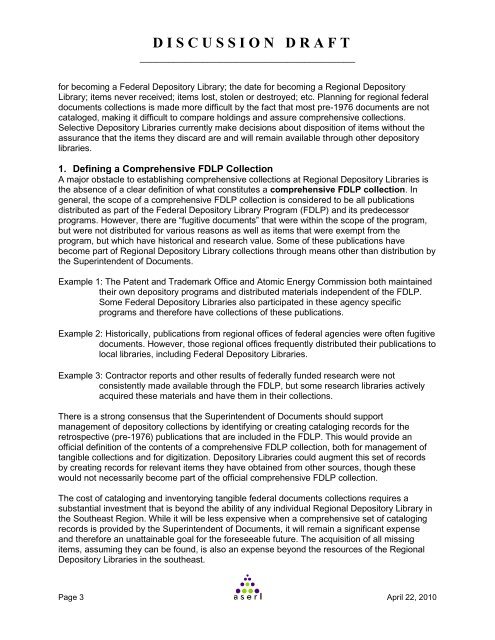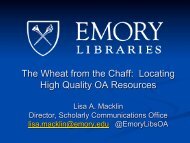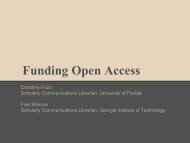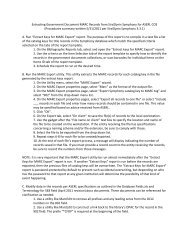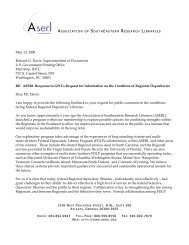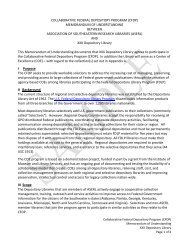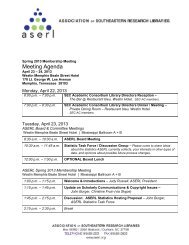PROPOSED ASERL GUIDELINES FOR - Association of ...
PROPOSED ASERL GUIDELINES FOR - Association of ...
PROPOSED ASERL GUIDELINES FOR - Association of ...
You also want an ePaper? Increase the reach of your titles
YUMPU automatically turns print PDFs into web optimized ePapers that Google loves.
D I S C U S S I O N D R A F T<br />
______________________________________<br />
for becoming a Federal Depository Library; the date for becoming a Regional Depository<br />
Library; items never received; items lost, stolen or destroyed; etc. Planning for regional federal<br />
documents collections is made more difficult by the fact that most pre-1976 documents are not<br />
cataloged, making it difficult to compare holdings and assure comprehensive collections.<br />
Selective Depository Libraries currently make decisions about disposition <strong>of</strong> items without the<br />
assurance that the items they discard are and will remain available through other depository<br />
libraries.<br />
1. Defining a Comprehensive FDLP Collection<br />
A major obstacle to establishing comprehensive collections at Regional Depository Libraries is<br />
the absence <strong>of</strong> a clear definition <strong>of</strong> what constitutes a comprehensive FDLP collection. In<br />
general, the scope <strong>of</strong> a comprehensive FDLP collection is considered to be all publications<br />
distributed as part <strong>of</strong> the Federal Depository Library Program (FDLP) and its predecessor<br />
programs. However, there are “fugitive documents” that were within the scope <strong>of</strong> the program,<br />
but were not distributed for various reasons as well as items that were exempt from the<br />
program, but which have historical and research value. Some <strong>of</strong> these publications have<br />
become part <strong>of</strong> Regional Depository Library collections through means other than distribution by<br />
the Superintendent <strong>of</strong> Documents.<br />
Example 1: The Patent and Trademark Office and Atomic Energy Commission both maintained<br />
their own depository programs and distributed materials independent <strong>of</strong> the FDLP.<br />
Some Federal Depository Libraries also participated in these agency specific<br />
programs and therefore have collections <strong>of</strong> these publications.<br />
Example 2: Historically, publications from regional <strong>of</strong>fices <strong>of</strong> federal agencies were <strong>of</strong>ten fugitive<br />
documents. However, those regional <strong>of</strong>fices frequently distributed their publications to<br />
local libraries, including Federal Depository Libraries.<br />
Example 3: Contractor reports and other results <strong>of</strong> federally funded research were not<br />
consistently made available through the FDLP, but some research libraries actively<br />
acquired these materials and have them in their collections.<br />
There is a strong consensus that the Superintendent <strong>of</strong> Documents should support<br />
management <strong>of</strong> depository collections by identifying or creating cataloging records for the<br />
retrospective (pre-1976) publications that are included in the FDLP. This would provide an<br />
<strong>of</strong>ficial definition <strong>of</strong> the contents <strong>of</strong> a comprehensive FDLP collection, both for management <strong>of</strong><br />
tangible collections and for digitization. Depository Libraries could augment this set <strong>of</strong> records<br />
by creating records for relevant items they have obtained from other sources, though these<br />
would not necessarily become part <strong>of</strong> the <strong>of</strong>ficial comprehensive FDLP collection.<br />
The cost <strong>of</strong> cataloging and inventorying tangible federal documents collections requires a<br />
substantial investment that is beyond the ability <strong>of</strong> any individual Regional Depository Library in<br />
the Southeast Region. While it will be less expensive when a comprehensive set <strong>of</strong> cataloging<br />
records is provided by the Superintendent <strong>of</strong> Documents, it will remain a significant expense<br />
and therefore an unattainable goal for the foreseeable future. The acquisition <strong>of</strong> all missing<br />
items, assuming they can be found, is also an expense beyond the resources <strong>of</strong> the Regional<br />
Depository Libraries in the southeast.<br />
Page 3 April 22, 2010


